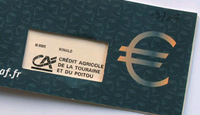If you wish to open an account with a French bank while you’re abroad, you must first obtain an application form, available from overseas branches of French banks. You must select a branch from the list provided, which should be close to where you will be living in France. If you open an account by correspondence, you must provide a reference from your current bank, including a certificate of signature or a signature witnessed by a solicitor. You also need a photocopy of the relevant pages of your passport and a euro draft to open the account.

Any account holder can create a joint account by giving his spouse (or anyone else) signatory authority. A joint account can be for two or more people. If applicable, you must state that cheques or withdrawal slips can be signed by any partner and don’t require all signatures. Note that in the event of the death of a partner, a joint account is blocked until the will has been proven.
Non-residents
If you’re non-resident (i.e. spend at least six months per year outside France), you’re only entitled to open a non-resident account ( compte non-résident). A non-resident account previously had many restrictions, including limiting account holders to making deposits from outside France only, but this is no longer the case. There may be limits on the amount you can transfer between accounts (an anti-money-laundering measure). Non-resident accounts have a ban on ordinary overdrafts ( découverts), although loans for a car or property purchase are possible.
French banks are imposing increasing minimum deposits on non-resident accounts; these can be up to € 3,000, although it isn’t usually necessary to maintain this balance once an account is open. To open a non-resident account, you must usually produce two pieces of identity, two proofs of address no more than three months old and a letter of recommendation from your existing bank.
Business Accounts
To open a business account, you must usually give the bank a copy of your articles of incorporation and a copy of your Kbis. When setting up a business, you must first deposit the required capital in a holding account, then use the receipt to support your registration; when you receive your first Kbis, give a copy to the bank, which then unblocks the account and opens a business account in the name of the company.
Business accounts are charged 0.005 per cent of all withdrawals of funds (known as commission de mouvement), plus an account ‘holding fee’ – i.e. a charge for nothing in particular, simply to keep the bank in profit – ( commision de tenue de compte), and charges are levied quarterly. Both fees are subject to VAT at 19.6 per cent. It costs more to have a bank card for a business account than for a personal account, and this is generally a charge card rather than a debit card. Charges for online access to your account are usually also higher: around € 20 per month instead of € 4 for personal account holders.
You can make direct debits from your customers’ accounts and various sorts of transfers (e.g. of payroll to employees’ accounts), facilities which are available online. Most standard accounting software packages offer electronic transfer features (payroll or bill paying) – although banks generally charge for these.
Chèque Emploi Service
A special cheque account, called Chèque Emploi Service, is available for those wanting to pay casual workers who don’t have accident or third party liability insurance. You must apply to your bank for a special cheque book, which usually takes two to three weeks to arrive and is accompanied by instructions for use. Before any work is done, complete the volet social corresponding to the cheque to be issued (it has the same number at the bottom) with the worker’s details and details of the work to be done and the rate. Tick the box base fortaitaire for basic insurance, salaire réel for comprehensive insurance.

Preferably before the work is done, send the volet social to the Centre National de Traitement du Chèque Emploi Service, 42961 Saint-Etienne Cedex 9 (addressed envelopes should be supplied) and the relevant social security contributions will be deducted automatically from your bank account. (You receive notification of the amounts to be deducted at the beginning of the following month and the deduction be made at the end of that month.) If you’re over 70, you’re exempt from making contributions on behalf of casual workers, but you must complete the form at the front of the cheque book as well as the volet social.
A leaflet entitled Chèque Emploi Service providing details of the system is available from your bank or from the Union de Recouvrement des Cotisations de Sécurité Sociale et d’Allocations Familiales (URSSAF), which has 105 offices throughout France and an informative website (www.ces.urssaf.fr). If you agree to pay casual workers in cash or by ordinary cheque and they have an accident on your premises, you can be sued for a very large sum of money.
This article is an extract from Making a living in France.
Click here to get a copy now.


